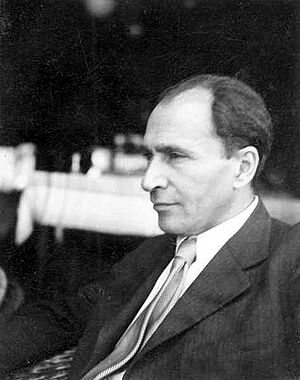Tibor Déry facts for kids
Tibor Déry (born October 18, 1894, died August 18, 1977) was a famous Hungarian writer and poet. He was born and passed away in Budapest, Hungary. Sometimes, he used other names for his writing, like Tibor Dániel and Pál Verdes.
A well-known philosopher named György Lukács once said that Déry was "the greatest depicter of human beings of our time." This means he was very good at showing what people are like in his stories.
Contents
Life and Early Career
Tibor Déry grew up in a comfortable family. His father was a lawyer, and his mother came from a wealthy family. In 1911, he finished his studies at the Budapest Academy of Commerce. He then spent a year in St. Gallen, Germany, learning German.
From 1913 to 1918, he worked for his uncle's lumber business. He worked first in Transylvania and then in Budapest. During this time, he started writing and managed to get some of his early works published.
Joining the Communist Party
After World War I, Tibor Déry joined the Communist Party. For a short time, during the Hungarian Soviet Republic, he was part of a group that helped lead the country.
When the Hungarian Soviet Republic ended, he was briefly arrested. He was released soon after. In 1920, he married Olga Pfeifer. Later that year, they moved out of Hungary.
Years Abroad and Return
Tibor Déry and Olga first lived in Vienna, Austria. There, he wrote for a Hungarian newspaper. In 1924, they moved to Paris, France. Then, in 1926, they went to Perugia, Italy. Even though he returned to Budapest not long after, he spent a lot of time traveling. He and Olga divorced in 1928.
In 1934, Déry took part in the Austrian Civil War. This was a short conflict in Austria. Because of his involvement, he had to leave and went to Spain. He only returned to Hungary in 1935.
Writing Under Difficult Times
During the time when Miklós Horthy led Hungary, the government was very strict. Tibor Déry was put in prison several times. One reason was that he translated a book by André Gide.
During this period, he wrote a very important novel called The Unfinished Sentence. It was a long story, about 1200 pages. It told the epic tale of a young aristocrat named Lorinc Parcen-Nagy. Lorinc learns about the lives of working-class people in Budapest during a big workers' strike.
In 1942, new laws were passed that affected Jewish people. To stay safe, Tibor Déry started writing under different names. After Germany occupied Hungary, he had to hide.
Post-War Life and Challenges
In 1945, Tibor Déry remarried. He also rejoined the Communist Party and was chosen to be a leader in the Hungarian Writers' Union. Over the next few years, many of his books that had not been published before finally came out. He divorced and married again in 1955.
In 1956, Déry, along with other writers like György Lukács, was removed from the Communist Party. This happened because they criticized the party's leaders. That same year, he wrote a famous story called Niki: The Story of a Dog. This book was a fable, meaning it used a story about animals to teach a lesson. It showed how people's lives were unfairly controlled in Hungary during that time.
Later in 1956, Déry became a spokesperson for the Revolutionary government. When the revolution was stopped in 1957, he was sentenced to nine years in prison. However, his sentence was put on hold in 1961, and he was fully forgiven in 1963.
Later Years and Legacy
After his release, Tibor Déry spent his time between Budapest and Balatonfüred. He passed away in 1977. After his death, a TV show about him was made on Hungarian television.
In 1984, a special prize was created in his honor. It's called the Tibor Déry Prize. This prize celebrates great achievements in literature. It was started with money from his widow, who passed away in 1979.
See also
 In Spanish: Tibor Déry para niños
In Spanish: Tibor Déry para niños
 | Bayard Rustin |
 | Jeannette Carter |
 | Jeremiah A. Brown |


